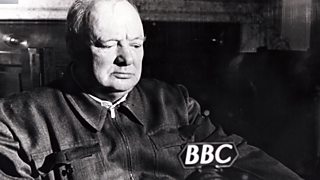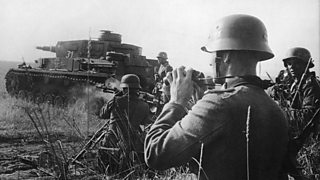The legacy of a 1940βs mixed-race couple
In 1943, Barclay Patoir left his home in what was then British Guiana to embark on a secret journey. His attention had been grabbed by an ad in the paper: Your Mother Country Needs You. The British government urgently required engineers to help with the war effort, and Barclay, an engineering student, was chosen over thousands of apprentices to fulfil this role.
Carrying with him just a rucksack and his passport, he embarked on a trip from the tropical climate of his home country up to Canada, then across the North Atlantic – braced at all times for a U-boat attack – to a war-torn Liverpool. Barclay never made a return journey and England became his home.
In Legacy of War, the way in which wartime experiences filter down through generations is explored. Barclay’s story, which intertwined with that of his wife Gertrude (Trudy), is one of great sacrifice and loss, but ultimately also hope. Here’s how his legacy lives on today.
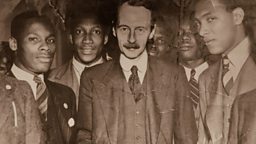
In the beginning
Liverpool in wartime was the antithesis of the verdant seaside city of Georgetown, British Guiana: “It was freezing cold, and the snow was an eye-opener” Barclay remembered. He went to work at the Avro factory, fitting and installing engines into Halifax bomber planes.
-
![]()
Legacy of War
How the experiences of men and women who took part in the war have informed the dynamics of their family in subsequent generations.
Meanwhile, the match factory in which Trudy worked was destroyed by a bomb, and with it her job. Needing to bring money home to her mother, she applied for a job at Avro, and was assigned as Barclay’s assistant.
βEveryone used to laugh at usβ Trudy recalled, βtheyβd say βheβs ruining you isnβt he?β"
While Trudy was at first apprehensive about working with a black man, they soon took a shine to one another.
“Everyone used to laugh at us” Trudy recalled, “they’d say ‘he’s ruining you isn’t he?’ He used to bring me sandwiches in and make me cups of tea.”
The two of them started going out, attending concerts and the cinema together. It was here that people would make their racial prejudices known, spitting at them in the street.
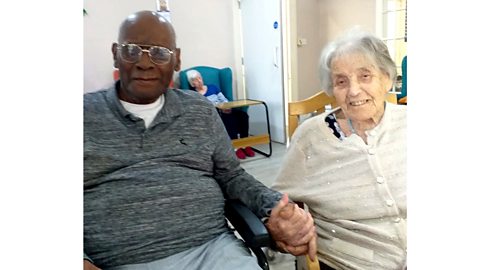
Barclay Patoir's journey to England
Why engineering student Barclay Patoir came to Liverpool to help with the war effort.
Family ties
The most cutting prejudice came, however, from Trudy’s own family. Both her mother and brother rejected her on account of her relationship with Barclay. Trudy’s mother eventually came round when Trudy and Barclay’s daughters were born, but her brother never knowingly saw them again, swearing he wanted nothing to do with her or her family.
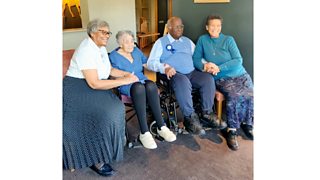
However, at a family funeral Trudy’s brother, whose eyesight was very poor, inadvertently had a long chat with his brother-in-law Barclay. Together they put the world to rights and he remarked “that was a nice chap – who was that?”
Trudy and Barclay’s daughter Betty explains that her estranged uncle also met her sister some years later. “She was a chaplain at a local hospital,” explains Betty, “and she happened to be there when my uncle was brought in with very advanced cancer. She was there as he died, giving him a blessing … he just whispered ‘tell Gert, I’m sorry about that’.”
Lasting legacy
Their grandson Max reflects on how Barclay not only made an invaluable contribution to the war effort, he also raised children and grandchildren who went on to become vital members of the community through public service work.
Though he came to the country with just a rucksack, Barclay worked with grit and determination to build himself a wonderful life from scratch.
Max is a consultant paediatric surgeon at Birmingham Children’s hospital. He thinks about the determination his grandfather instilled in him: “getting to that point for me took a long time, and that sort of thing runs in the family: once you start something you really want to finish it. The sacrifices I’ve had to make to get to where I am today pale into comparison to the sacrifices Barclay had to make.” Barclay never saw his parents or sisters again.
Though he came to the country with just a rucksack, Barclay worked with grit and determination to build himself a wonderful life from scratch.
Trudy, too, made huge sacrifices, but the pair were spurred on by their undying love for one another.
After the war, the couple moved to Manchester, where Barclay worked as a shop steward for the dry dock. Trudy and Barclay lived in one room together, in the only boarding house which would accept them. “The landlady had lodgers in, but she took us in anyway and gave us her big front room. She was a prostitute herself, but what a good woman she was.” Trudy told the ΒιΆΉΤΌΕΔ in 2017.
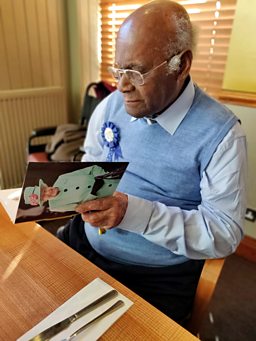
Barclay went on to become the president of the local social club. There, he offered opportunities to individuals who could have been headed for trouble. Recently, at Barclay’s 100th birthday party, two of these men came forward to mention the life-changing impact his compassion had had on them, in keeping them on the straight and narrow and showing them where exemplary behaviour could take them.
Together forever
Eventually, the couple bought a home together, where they lived for 70 years. Recently, Barclay became bed-bound, yet his love for Trudy saw him offering to support his wife, holding out his hands to help her get up despite the fact he himself could hardly move. “He’ll be quiet and quiet until Trudy is there, and then it’s as if he is reawakened.” says his daughter Betty, “I believe firmly that he is staying alive because he doesn’t want Trudy to be left alone.”
Within a week of recording for Legacy of War, Trudy and Barclay passed away just hours apart of one another. They stuck together through work, war and prejudice, so that as a couple they could lead a fulfilling life. And then they left together.
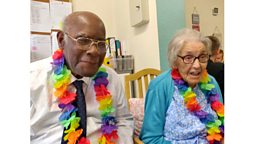
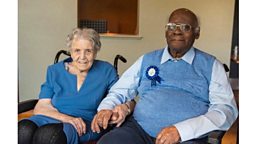
More from Radio 4
-
![]()
Legacy of War: Barclay Patoir
A powerful story of opportunity and sacrifice during the Second World War leaving a legacy of dedication and love.
-
![]()
Five racist myths debunked
Separating fact from myth in understanding how we are different and how we are the same.
-
![]()
Do white people need to think more about their race?
Anti-racist activists and academics are now urging white people to recognise that they are just as racialised as minorities.
-
![]()
In Our Time: War in the 20th Century
Melvyn Bragg talks to Sir Michael Howard about warfare of the 20th century.
